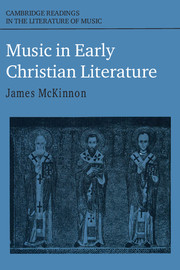Book contents
- Frontmatter
- Contents
- Preface
- Introduction
- 1 The New Testament
- 2 The Christian literature of the first and second centuries
- 3 The Greek authors of the third century
- 4 Western authors of the third and early fourth centuries: Carthage and Rome
- 5 Fourth-century Alexandria and desert monasticism
- 6 Fourth-century Asia Minor: the Cappadocians
- 7 Palestine, Antioch and Syria
- 8 The Greek historians
- 9 The Apostolic Constitutions, Egeria, and the eastern councils
- 10 Western authors of the fourth and early fifth centuries
- 11 Augustine and minor western authors
- Epilogue
- Bibliography
- Index of musical and liturgical terms and concepts
10 - Western authors of the fourth and early fifth centuries
Published online by Cambridge University Press: 05 June 2012
- Frontmatter
- Contents
- Preface
- Introduction
- 1 The New Testament
- 2 The Christian literature of the first and second centuries
- 3 The Greek authors of the third century
- 4 Western authors of the third and early fourth centuries: Carthage and Rome
- 5 Fourth-century Alexandria and desert monasticism
- 6 Fourth-century Asia Minor: the Cappadocians
- 7 Palestine, Antioch and Syria
- 8 The Greek historians
- 9 The Apostolic Constitutions, Egeria, and the eastern councils
- 10 Western authors of the fourth and early fifth centuries
- 11 Augustine and minor western authors
- Epilogue
- Bibliography
- Index of musical and liturgical terms and concepts
Summary
Included here are the major western authors born in the fourth century with the exception of Augustine, who is reserved for the final chapter. They are five in number: Hilary of Poitiers, Ambrose, Niceta of Remesiana, Jerome and Cassian. Hilary, perhaps, makes the most modest contribution of the group with his psalm commentary, the first Latin example of the genre. Ambrose, of course, is well known as one of the most musically significant church fathers, while Niceta of Remesiana, comparably significant due to his remarkable sermon on psalmody, has been largely ignored until recent times. Jerome, the celebrated translator of the Vulgate, has left us numerous brief remarks on the place of music in the monastic and ascetic life, and finally Cassian is probably the most important contributor to our knowledge of psalmody in the monastic office prior to St Benedict.
Generally considered, these authors provide musical references very similar to those of their eastern contemporaries. They display the same position of antagonism toward pagan musical practice, the same cautious acceptance of academic music, and the same penchant for instrumental allegory; while in the area of liturgical music they describe the same phenomena of psalmody in the Eucharist, at vigils and in the daily round of monastic office hours. In this sense they merely corroborate what we already know, but there is one essential differentiating factor – that of chronology.
- Type
- Chapter
- Information
- Music in Early Christian Literature , pp. 121 - 152Publisher: Cambridge University PressPrint publication year: 1987



